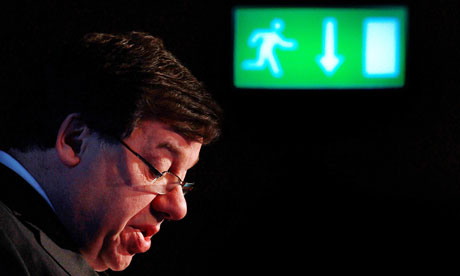Ireland has mixed feelings over multi-billion euro IMF bailout
![]()
Ireland’s leader in denial over IMF bailout – but support for loan among Irish people shows lack of confidence in government
Lisa O’Carroll

For a decade the country rode a seemingly never-ending boom, fuelling prosperity that previous generations could scarcely have dreamed of. Today reality kicked in. The 12 men and women from the International Monetary Fund, in suits and sensible coats, arrived in Dublin to clear up the mess.
By any measure it was an extraordinary day for Ireland. Historian Diarmuid Ferriter described it as devastating and a “humiliating milestone” that the nation’s sovereignty was being compromised nearly 100 years after hard-fought independence. A leader in the Irish Times talked of ignominy. “There is the shame of it all,” it said. “Having obtained our political independence from Britain to be masters of our own affairs, we have now surrendered our sovereignty to the European commission, the European Central Bank, and the IMF.”
But the country’s inhabitants probably didn’t have much time to read their papers yesterday. At 8.20am, the governor of the Irish Central Bank confirmed – despite protestations by the taoiseach, Brian Cowen, that there was no IMF bailout – that an IMF loan of tens of billions of euros was being prepared.
By mid-afternoon the country seemed to have descended into chaos. There were angry outbursts in the Daíl, accusations of a government cover-up, new threats voiced over the country’s low corporation tax rate. Cowen nearly lost his temper with reporters. Again. The finance minister admitted the banks had “very big issues”. And to cap it all, there were fresh accusations that the banks were lying about their figures to maximise the price they would get from the state, which nationalised the banks’ most toxic debts this year.
There is little doubt that it will get worse before it gets better. One senior government adviser told friends yesterday afternoon: “It’s not over, not by a long shot, we have a long way to go yet.”
Out on the streets of Dublin, there were mixed feelings about Ireland losing its sovereignty, but there was also support for the IMF – a reflection of the widespread lack of confidence in the government.
Asked what she thought of the IMF’s arrival in Dublin Sheila McCarthy, a nurse, was unequivocal. “I actually think it’s wonderful,” she said, “if we could get to the bottom of whatever our problem is and get working again.”
She is one of the people facing more brutal cuts in next month’s budget , but she says all she wants to know is whether the cut is going to be 30% or 50%. “If I knew what was ahead of me I would accommodate whatever it is, just tell us what it’s going to be and let’s get on with it.”
Eamonn Cullen, a pensioner, was of a similar view. “If they have to come in and bail us out, they have to. I mean Cowen has been lying through his teeth for months and months. It’s unbelievable the way they’ve run this country down.” The message was clear: bring on the IMF.
“It’s a sad day for Ireland but ultimately it will be for the better. I think we’re in such a mess that no one else is capable of getting us out of it in this country,” said Seamus McNamee of the Celtic Whiskey Shop in Dawson Street.
The IMF took the unusual step of announcing at a press conference in Washington that it wasn’t about to decimate Ireland’s social welfare. A spokeswoman said: “Part of that [job] is to ensure that the poor and most vulnerable are protected.” The truth is maybe less palatable. Evidence from other countries that have had IMF “medicine” suggests thousands of civil servants will lose their jobs, public sector wages will be slashed, university fees increased and a property tax introduced.
By late afternoon a media scrum had descended on the five-star Merrion hotel where IMF team leader Ajai Chopra and his “mission” will be based. The doorman shook his head. “It is sad that we are reduced to this. We have worked hard all our lives and we’ve had to pay our own way. To be taking a bailout now is not right.”
Related Articles
Buffett, Gates, Rockefeller and the Conscience of the Very, Very Rich
![]()
The Great Marginalization Of all the farcical notions put forth during this time of high farce, casting America as “broke”
Tour to give momentum to trade with ‘Arab Spring’ nations
![]()
ERG?N HAVA ?STANBUL Prime Ministar Erdo?an observes his welcome ceremony next to an Egyptian senior official in Cairo, where he
Egypt: End of Hope
![]()
Battleground Cairo Instead of passion and hope, all there is left on the streets of Cairo is depressing defeatism, frustration


